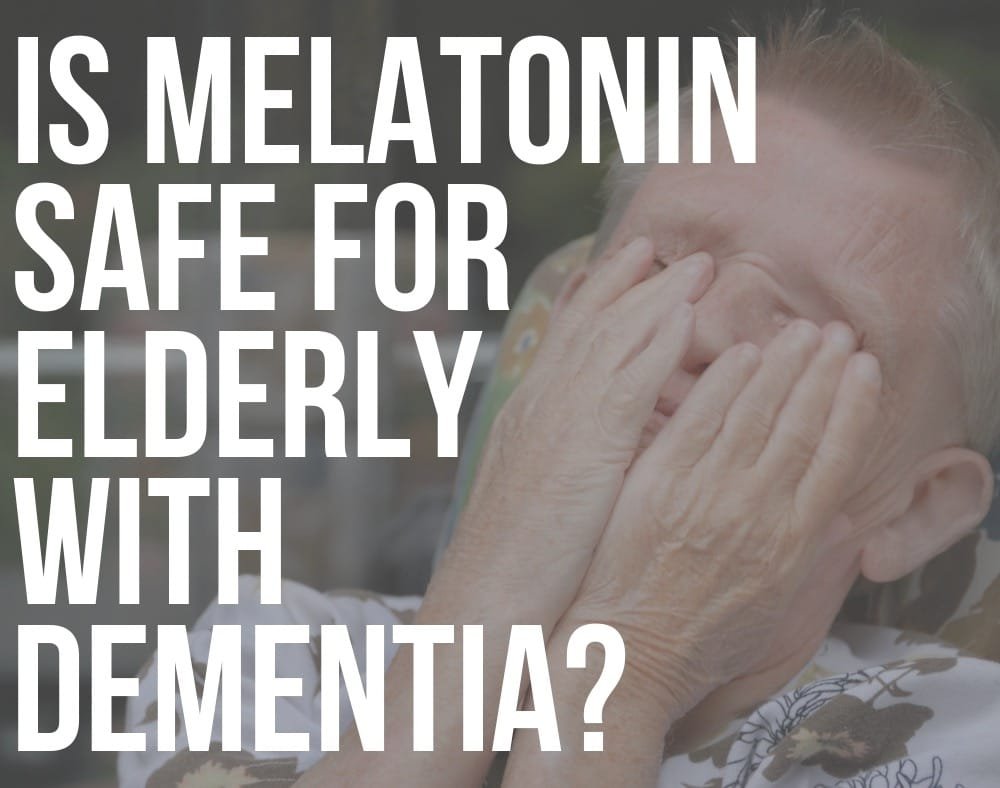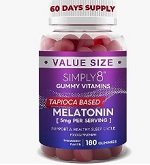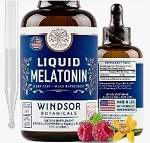When a person with dementia has sleep issues, we, as caregivers, wondered many times- is melatonin safe for elderly with dementia?
We went on a long journey of studying, reviewing and even testing melatonin ourselves.
Is Melatonin Safe For Patients With Dementia?
The supplements are generally safe and can be used to treat insomnia in people who have trouble getting quality sleep.

The drugs can improve sleep moderately.
Even though the drugs may be safe for most healthy people, some experts do not recommend melatonin for seniors with dementia.
This view has been backed by the American Academy of Sleep Medicine.
The institution does not advise elderly people with dementia to use melatonin or other sleep-promoting drugs.
Not All Experts Recommend Melatonin
This is due to an increased risk of falling as well as other adverse effects.
The adverse effects of melatonin supplementation though rare include:
- Drowsiness
- Nausea
- Hypothermia (lower body temperature)
- Decreased blood flow
Melatonin may also be UNSAFE for individuals who have orthostatic hypotension, diabetes, bleeding disorders, autoimmune illnesses, depression, transplant recipients, and seizure disorders.
When it comes to answering the query is melatonin safe for elderly with dementia there are conflicting responses.
Some experts state that it is safe while others say it is not.
This is because, in elderly persons who have dementia, melatonin treatment has proved to worsen caregiver rating of the person’s mood.
Additionally, it might also interfere with other drugs the individual may be taking.
Bellow are some of the studies that may help answer the query is melatonin safe for elderly with dementia.
Studies Regarding Melatonin and Dementia
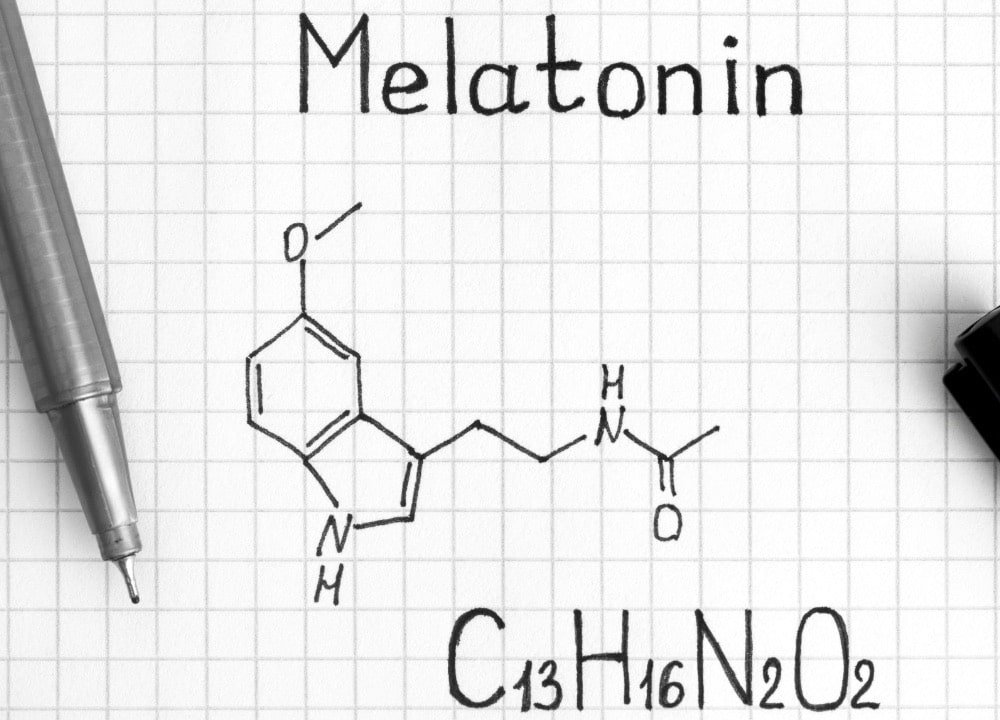
Researchers from the Netherlands Institute for Neuroscience reviewed the perks of melatonin and the effect of environmental light on seniors with dementia.
The study that was published in the Journal of the American Medical Association reported that melatonin was useful with sleep issues.
However, it also increased withdrawn dementia-related behavior. The results were enhanced when combined with a bright light environment. The study involved 189 elderly persons.
Most of the participants (87%) had dementia. All the participants were living in assisted care facilities.
The seniors were assigned to different groups randomly.
The groups received different treatments and these included:
- Melatonin and dim light exposure
- Melatonin and bright light exposure
- Placebo and dim light
- Placebo and bright light
The researchers discovered that melatonin helped to enhance the onset of sleep as well as sleep duration by 27 minutes.
Side Effects
However, it was also the cause of unwanted side effects of increased depressive and withdrawn behaviour in participants.
Bright light therapy was also linked to improvements in depressive and cognitive deterioration symptoms as well as improved functional abilities and daily living activities.
The experts concluded that a combination of the two therapies produced the best results. This resulted in a decrease in agitation, night-time restlessness, and aggression.
It seemed that a bright light environment countered the negative melatonin effects.
A pilot study was also conducted that may help answer the question is melatonin safe for elderly with dementia.
The researchers wanted to assess the tolerability and efficacy of melatonin in treating sleep disturbances in the elderly.
The professionals observed 41 patients of whom 28 were female and 13 were male with a mean age of 74 ± years.
Studying Three Groups
The participants were separated into three groups:
1. Participants with sleep disturbances only
2. Members with sleep disturbances and symptoms of depression
3. Persons with sleep disturbances and dementia of the vascular or degenerative type
All participants of the study were orally given 3-mg gelatin capsules of melatonin for 21 days 30 minutes before expected sleep time.
Sleep logs and structured clinical interviews were used to assess daytime alertness and overall sleep quality. Melatonin IMPROVED sleep quality SIGNIFICANTLY from day 2 or 3 of treatment reducing the number of awakenings in participants with sleep disturbances.
Participants also recorded improved daytime alertness in persons who were only experiencing sleep disturbances.
Clinical assessments recorded that symptoms improved in 73% of the patients with sleep disturbances only and 44% of participants with sleep disturbances associated with depression.
70% of the participants with dementia also recorded a significant decrease in sundowning.
Some participants who were on benzodiazepines also reduced intake during the treatment duration. The researchers did not note any side effects attributed to the treatment.
Results of the study suggest that melatonin may help treat primary sleep disturbances in seniors.
Melatonin Options Available on Amazon
Foods Rich in Melatonin

Supplements are not the only source of melatonin when the body is not producing enough.
Scientists have identified some foods that are great sources of melatonin and these include
Tart Cherries
Tart Cherry juice is one of the most popular sleep aids.
Professionals have uncovered that they increase melatonin levels in the body; hence, improves sleep.
Because the juice version is high in sugar, it may not be recommended to drink it at night. It is healthier to eat cherries instead.
Warm Milk
For ages, warm milk has been used as an effective insomnia remedy implying that the beverage is high in melatonin.
Eggs
Eggs are a nutritious source of melatonin also offering iron and protein among other essential nutrients.
Fish
Fish is a better source of melatonin when compared to the other types of meat.
The best options are oily fish like sardines and salmon which also offer beneficial omega-3 fatty acids.
Goji Berries
In addition to having anti-aging effects, goji berries are high in melatonin and may be useful in enhancing sleep.
Nuts
Many nut options have good amounts of melatonin.
Almonds and pistachios have the highest levels. Nuts are also good sources of minerals, antioxidants, and healthy omega 3 fats.
Closing Thoughts – is melatonin safe for elderly with dementia?
Because sleep problems are common for people with dementia, it is not a surprise when people ask is melatonin safe for elderly with dementia.
It is not yet 100% clear whether melatonin supplementation is safe or not for seniors with dementia.
This is because some experts claim it is safe especially when combined with other alternative therapies like bright light exposure while others say it is not.
This simply means that more scientific studies need to be done on the use of melatonin supplementation in seniors with dementia.
This said it is important to note that different people react differently when they take melatonin.
It is; therefore, crucial for a person with dementia to consult a physician first before taking any medication or supplement to be on the safe side.
Bonus: What is Melatonin
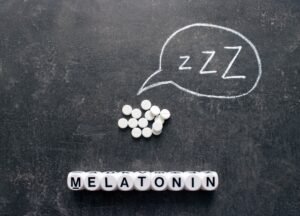
Melatonin can be described as a hormone that is produced by the pineal gland and is responsible for regulating the circadian rhythms which is the sleep-wake cycle.
It is also known as the darkness hormone because under normal conditions, the human body synthesizes melatonin at night and it is inhibited during the day.
In addition to managing the natural sleep cycle melatonin also has pleiotropic effects like anti-inflammatory, antiapoptotic, antioxidant, and immunomodulative effects.
As people grow older the body begins to produce less melatonin.
Research also shows that people with different types of dementia experience impaired melatonin production. This means that they may develop insomnia where persons with the progressive illness may have trouble sleeping.
This may also result in impaired cognitive function in the affected individuals and other symptoms like sundowning caused by circadian disorganization.
When this happens, physicians may prescribe melatonin supplements.

